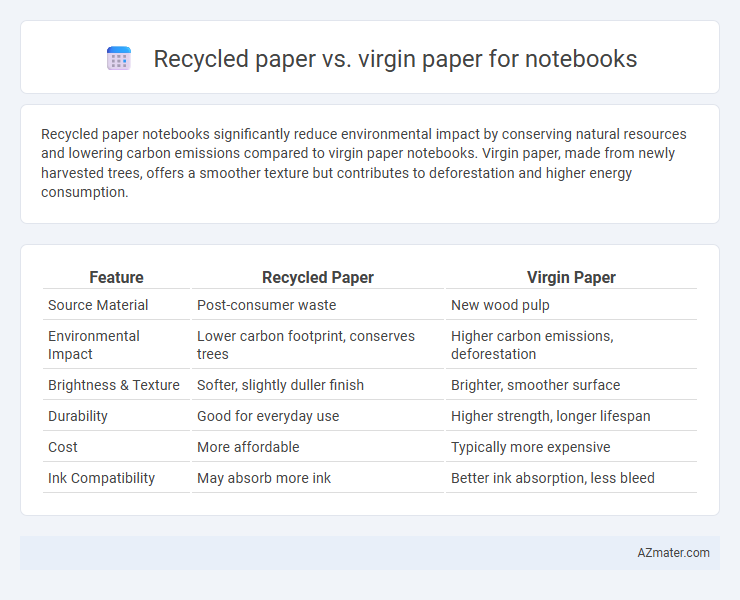Recycled paper notebooks significantly reduce environmental impact by conserving natural resources and lowering carbon emissions compared to virgin paper notebooks. Virgin paper, made from newly harvested trees, offers a smoother texture but contributes to deforestation and higher energy consumption.
Table of Comparison
| Feature | Recycled Paper | Virgin Paper |
|---|---|---|
| Source Material | Post-consumer waste | New wood pulp |
| Environmental Impact | Lower carbon footprint, conserves trees | Higher carbon emissions, deforestation |
| Brightness & Texture | Softer, slightly duller finish | Brighter, smoother surface |
| Durability | Good for everyday use | Higher strength, longer lifespan |
| Cost | More affordable | Typically more expensive |
| Ink Compatibility | May absorb more ink | Better ink absorption, less bleed |
Introduction to Notebook Paper Choices
Notebook paper choices significantly impact environmental sustainability and writing experience, with recycled paper made from post-consumer waste offering a reduced carbon footprint and conservation of natural resources. Virgin paper, derived directly from fresh wood pulp, delivers higher brightness and smoother texture favored for professional notebooks. Selecting between recycled and virgin paper depends on balancing eco-friendly benefits against desired paper quality and appearance.
What is Recycled Paper?
Recycled paper is produced by reprocessing used paper materials, reducing the need for virgin wood pulp and conserving natural resources. It commonly consists of post-consumer waste such as office paper, newspapers, and cardboard, which undergo cleaning and re-pulping to create new paper sheets. Using recycled paper for notebooks lowers environmental impact by minimizing deforestation, water usage, and energy consumption compared to virgin paper production.
Understanding Virgin Paper
Virgin paper, made directly from fresh wood pulp, offers superior strength, brightness, and smoothness crucial for high-quality notebook pages. It lacks contaminants found in recycled fibers, ensuring better ink absorption and durability for writing and sketching. Although more resource-intensive, virgin paper provides consistent texture and appearance, preferred in premium notebooks requiring archival longevity.
Environmental Impact: Recycled vs. Virgin Paper
Recycled paper for notebooks significantly reduces deforestation and conserves water by using 30-70% less energy compared to virgin paper production. Virgin paper contributes to habitat loss and carbon emissions due to logging and intensive pulping processes. Choosing recycled paper supports sustainable forestry and lowers greenhouse gas emissions, making it a more eco-friendly option.
Production Process Comparison
Recycled paper production for notebooks involves collecting and processing used paper waste, which reduces deforestation and energy consumption by up to 60% compared to virgin paper manufacturing. Virgin paper production requires the harvesting of fresh timber, mechanical or chemical pulping, and bleaching processes that consume significantly more water and emit higher levels of pollutants. Recycled paper fibers, though sometimes shorter and less durable, minimize environmental impact, making the production process more sustainable overall.
Paper Quality and Durability
Recycled paper for notebooks often has a slightly lower brightness and may contain small fibers from previous uses, impacting its smoothness compared to virgin paper, which is made from fresh wood pulp and typically delivers superior texture and clarity. Virgin paper offers higher durability and resistance to wear, making it ideal for notebooks that require long-lasting pages and robust writing surfaces. While recycled paper promotes environmental sustainability, notebooks made with virgin paper generally ensure better performance in terms of paper strength and resistance to ink bleed-through.
Cost Analysis: Recycled vs. Virgin Paper
Recycled paper for notebooks typically costs 10-30% less than virgin paper due to lower raw material expenses and reduced energy consumption in production. Virgin paper incurs higher costs because of the need for fresh timber processing and more intensive chemical treatments. Choosing recycled paper can significantly lower manufacturing expenses and support sustainable sourcing, improving overall cost efficiency.
Consumer Preferences and Trends
Consumers increasingly prefer recycled paper notebooks due to growing environmental awareness and sustainability concerns, making eco-friendly products a key purchasing factor. Market trends indicate a rising demand for recycled paper notebooks, driven by millennials and Gen Z prioritizing reduced carbon footprints and waste reduction. Despite this, some consumers still favor virgin paper for its perceived higher quality and durability, though advancements in recycled paper technology are narrowing this gap.
Certifications and Eco-labels to Consider
Certified recycled paper notebooks often carry FSC Recycled or PCF (Processed Chlorine-Free) certifications, ensuring responsible sourcing and minimal environmental impact. Virgin paper notebooks typically feature FSC or PEFC certifications, validating sustainable forest management and traceability from growth to production. Eco-labels such as EcoLogo, Green Seal, and EU Ecolabel further certify compliance with stringent environmental standards, crucial for verifying the ecological benefits of both recycled and virgin paper products.
Choosing the Right Paper for Your Notebook
Choosing the right paper for your notebook depends on balancing environmental impact and paper quality. Recycled paper reduces deforestation and energy consumption while often maintaining durability and print clarity suitable for most writing needs. Virgin paper typically offers smoother texture and higher brightness, ideal for precision writing or artistic use but comes with a higher environmental footprint.

Infographic: Recycled paper vs Virgin paper for Notebook
 azmater.com
azmater.com